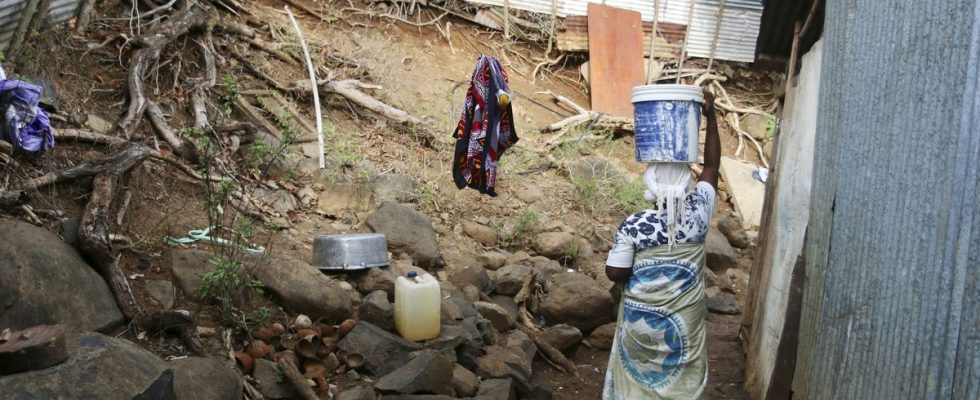Mayotte in “sub-France”? Elisabeth Borne is going to the department this Friday to make announcements on water, housing and health, in this poorest department in France, facing a serious drought, migratory pressure from neighboring Comoros and growing insecurity.
After a traditional welcome at Petite-Terre airport, the head of government accompanied by two ministers, Aurélien Rousseau (Health) and Philippe Vigier (Overseas), will discuss the water shortage, to which the inhabitants have no access only one day in three.
Water crisis, security crisis
It was this crisis that initially motivated this move. But this archipelago in the Indian Ocean of 310,000 inhabitants, where Marine Le Pen received nearly 60% of the votes in the last presidential election, has also been shaken for several weeks by clashes between villages, which led to the sending of reinforcements in police.
This visit of around twelve hours, the first by a head of government since Manuel Valls in 2015, coincides with the start of the examination in the Assembly on Monday of the very sensitive immigration bill on which Gérald Darmanin is in First line.
The Minister of the Interior came to the archipelago in June to defend the controversial Wuambushu police operation to fight unsanitary housing (slums), crime and illegal immigration.
Support for invoices “as long as necessary”
The fight against irregular immigration and insecurity are “absolute priorities”, we explain to Matignon. “However, the government’s policy towards Mayotte cannot be reduced to these two policies” and provides an “overall vision for its development”. “We need more schools, health establishments of greater capacity, we need to be able to study”, “get around better”.
Mayotte is facing the worst drought since 1997, made worse by a lack of infrastructure and investment. The Prime Minister will announce the continuation of the free distribution of bottled water and the covering of bills “as long as necessary”, as well as the extension of aid to businesses.
She will confirm the construction of a second desalination plant, but which will only produce water at the beginning of 2025, instead of 2024. She will then visit a shanty town which must soon be dismantled in Koungou, where she will announce the creation of a Operation of national interest in three municipalities to help rehousing its residents.
“Call for air”
The subject of housing is debated on the island. MP LR Mansour Kamardine thus considers that new constructions will lead to “a breath of fresh air” for immigration. Half of the population does not have French nationality, according to INSEE, even if a third of foreigners were born on the island. And around 30% of housing is unsanitary housing.
The results are still awaited. Operations against slums have made it possible to destroy around 700 informal settlements (or huts) this year, compared to 1,600 in 2021. The number of expulsions of illegal immigrants has fallen: around 22,000 since the start of the year, compared to 25,000 in 2022.
At the departmental council, Elisabeth Borne will sign a “financial agreement” by which the State will provide 100 million euros in 2024 for early childhood, whose expenses are exploding in the face of demographic growth of 4% per year. She will also visit the only hospital in Mayotte, which is seriously lacking in caregivers, to announce its expansion and modernization, as well as new training offers to attract nurses.
Measures that meet expectations?
On security, Elisabeth Borne will notably announce a strengthening of the means of the Shikandra plan to combat irregular immigration, with the modernization by 2027 of surveillance radars at sea.
It remains to be seen whether these measures will live up to the expectations of local elected officials who are first asking for the expulsion of migrants installed in a stadium in Mamoudzou.
Independent MP Liot Estelle Youssouffa, who wants to restrict land law, already toughened in 2018, warns against a “compassionate” speech which would be poorly received given the “volatility of the situation”. “The population is frustrated by the slowness and apparent powerlessness of the law and state services to protect them.” On behalf of health professionals on the island, doctor Jean-Marc Roussin is calling for a “state of emergency” and the establishment of “humanitarian-type” medicine.

